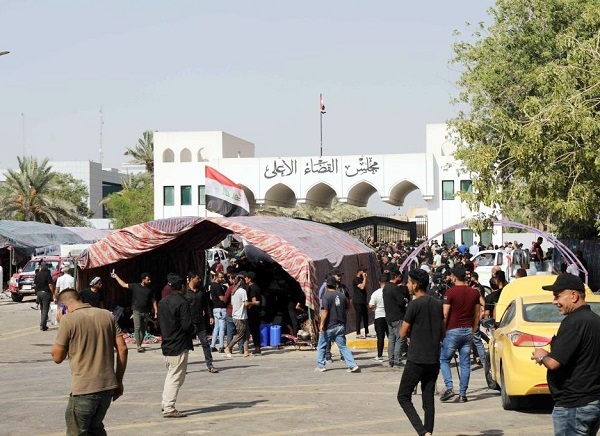Baghdad, (Asian independent) Iraq’s top officials and political leaders held a meeting to discuss political development and agreed to work on a roadmap aimed at ending the stifling crisis the country is going through.
In a meeting attended by President Barham Salih, Parliament Speaker Mohammed al-Halbousi, the Special Representative of the UN Secretary-General for Iraq Jeanine Hennis-Plasschaert, and other top leaders, it was decided “to form a team from various political parties to develop a roadmap to reach early elections and achieve their requirements by reviewing the election law and reconsidering the electoral commission”, said a statement issued by caretaker Prime Minister Mustafa al-Kadhimi’s office.
Monday’s meeting stressed “the national responsibility of maintaining stability, protecting the country from crises, supporting efforts to calm down, preventing escalation and violence, and adopting a national dialogue to reach solutions”, Xinhua news agency quoted the statement as saying.
It also stressed the need to reform the Iraqi political structure through the necessary legislation and effective government programs, with constitutional adherence at all stages of dialogue and solution.
The meeting renewed the call for the Sadrist Movement to participate in the dialogue meetings to reach solutions to all contentious issues.
Last month, political leaders held the first round of dialogue at the invitation of al-Kadhimi to find a way out of the crisis in the country, but prominent Shia leader Moqtada al-Sadr did not attend or send a representative on his behalf.
He did the same at Monday’s meeting.
On Sunday, al-Halbousi called on the parliamentary blocs to hold new rounds of dialogue on various issues, including early elections.
Political tensions in Iraq have escalated in the past weeks between al-Sadr and his rivals in the Shia Coordination Framework, an umbrella group of Shia parliamentary parties.
During the past months, the continued disputes among the Shiite parties have hampered the formation of a new government, making it unable to elect a new president by a two-thirds majority of the 329-seat Parliament under the Iraqi constitution.








